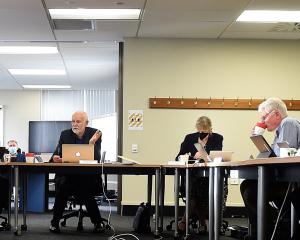A vision for Dunedin Hospital is promoted in a hard-hitting internal report expressing serious concerns about the state of the hospital which, it says, offers many patients a "very poor service".
The report, from the Southern District Health Board's "Putting the Patient First" governance group, paints a crunch-time picture of a physically crumbling hospital where cost-cutting and making money from elective surgery has preoccupied successive managers. Services do not work together and frustrating bottlenecks abound.
The report is described as a strategic plan for improving the patient journey through Dunedin and it follows several months of information-gathering by the group to identify problems and find patient-centred and evidence-based solutions.
It emphasises the need for ongoing quality improvement to be an integral part of how the hospital works. Recognition of this was "sorely lacking", along with the expertise to guide and teach the necessary skills for this.
"There is no future worth contemplating if this is allowed to continue."
Otago's chief operating officer, Vivian Blake, who chaired the group, said the National Health Board had seen the report and supported its contents.
The SDHB, in closed session at its meeting last week, endorsed the report and the four-part vision involving fair services, excellent patient experience, value for money and an emphasis on teaching and learning.
Mrs Blake agreed getting staff on side would be crucial, but it was also important for them to see from the outset the board and chief executive Brian Rousseau had endorsed the report.
In its report, the governance group says a patient's journey through the hospital, and co-ordination of services, have not been the focus of the hospital's operation.
Struggles with a "seemingly insurmountable deficit", funding restraints and constant Government scrutiny had led to an institutional culture with entrenched behaviour which was frequently counter-productive.
"Processes and behaviours in the organisation are generally inward-looking and are often counter-productive or perverse, but have arisen because of constraints on cost, or as a result of frustration arising from similar maladaptive processes by others," it said.
Reductions in cost in one part often made it difficult or impossible for functions in other parts to proceed efficiently, producing waste and frustration.
In most areas, staff numbers had been kept in check or reduced with little regard for severe bottlenecks that could be produced for other services.
While it was seldom deliberate, waste was everywhere.
"On top of this, despite some heroic efforts in some departments, many of our patients get a very poor service".
It listed patients waiting for many hours in the emergency department, those who took 24 hours or more to be admitted to a ward, those who waited for days for access to the acute operating theatre, those who could not get colonoscopies and those waiting months for scans.
Many patients stayed in the hospital for a day or so more than they needed to because discharge decision-making and processes were often ad hoc. Information for general practitioners was often non-existent, late or inaccurate, particularly about changes to medication while in hospital.
`Medicine reconciliation [or lack of it] stands out as one of the greatest risks to patients in the transition from hospital to home."
The report said so little money had been spent on hospital buildings that many areas were no longer fit for purpose, too small or "just plain shabby".
"The accumulated backlog of capital development is reaching frightening levels".
The decision in the 1990s to "cram" almost all services on to the Dunedin site had imposed severe limitations and restrictions for the last 15 years, the full implications of which were now only too apparent.
The master site plan, which involved redeveloping both Dunedin and Wakari hospitals, and had been delayed by funding concerns, needed to be re-visited urgently to ensure it was still appropriate.
This should also include a review of how services were provided and a clear consensus reached on this across the hospital, the report said.
The report made it clear changes would cost money.
"The prospect of the perpetual spiral of cost-cutting or containment, waste and frustration at every turn, and the crumbling plant all around us can only eventually lead to a demoralised, cynical staff, who either leave or cease to care.
"Political fallout from continuing to deliver a poor service to our patients and falling short of targets being met by most other DHBs will be severe."
The group said it seemed important to work closely with the NHB which was already reviewing hospital systems.
Starting in an environment where there was considerable scepticism was a major challenge and a communication strategy was critical.
It needed to be ascertained quickly whether the majority of staff agreed with the proposed vision, the report said.
"Overcoming cynicism requires credibility ... staff have to believe everyone in the organisation will live up to the vision, that they will get the resources and support they need to do so," the report said.
Governance group
• Vivian Blake (Otago chief operating officer).
• Mike Hunter (clinical leader intensive care).
• Leanne Samuel (chief nursing and midwifery offer).
• Lynda McCutcheon (allied health director).
• Richard Bunton (Otago chief medical officer).
• Richard Thomson (board member).
• Dr Tim Kerruish ( ED clinical leader).
The vision
• Dunedin Hospital's four fundamental pillars.-
• Fair and just services.
• Excellent experience for patient.
• Value for money.
• Teaching and learning.
Advertisement













